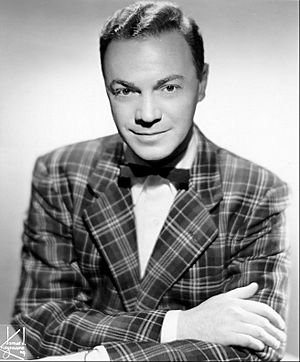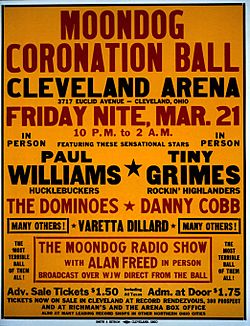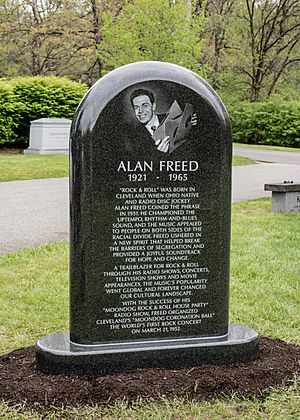Alan Freed facts for kids
Quick facts for kids
Alan Freed
|
|
|---|---|

Freed c. 1958
|
|
| Born |
Albert James Freed
December 15, 1921 Windber, Pennsylvania, U.S.
|
| Died | January 20, 1965 (aged 43) Palm Springs, California, U.S.
|
| Resting place | Lake View Cemetery, Cleveland, Ohio, U.S. |
| Occupation | Disc jockey |
| Years active | 1945–1965 |
| Spouse(s) |
|
| Children | 4 |
Albert James "Alan" Freed (December 15, 1921 – January 20, 1965) was an American disc jockey, also known as a DJ. He played a huge role in making rock and roll music popular across North America. He also organized big concerts with many different music acts.
Alan Freed helped bring people together through music. In the 1950s, he encouraged both white and Black teenagers to listen to the same music. This helped break down racial barriers in pop culture.
In 1986, Freed was added to the Rock and Roll Hall of Fame. In 1991, he received a star on the Hollywood Walk of Fame. He became famous for playing African-American rhythm and blues music on the radio. He called this music "rock and roll."
Later in his career, Freed faced challenges. He was involved in a scandal about accepting gifts to play certain songs. This affected his career.
Early Life and Dreams
Alan Freed was born in Windber, Pennsylvania. His mother was Welsh-American and his father was a Russian Jewish immigrant. In 1933, his family moved to Salem, Ohio. He graduated from Salem High School in 1940.
In high school, Freed played the trombone in a band called the Sultans of Swing. He first wanted to be a bandleader. However, an ear infection stopped that dream.
While at Ohio State University, Freed became interested in radio. He served in the US Army during World War II. During this time, he worked as a DJ on Armed Forces Radio. After the war, he got jobs at smaller radio stations. He became popular for playing hot jazz and pop songs.
His Amazing Career
Alan Freed was the first radio DJ to regularly play and promote rock and roll music. He helped make the phrase "rock and roll" famous on mainstream radio in the early 1950s. The term had been used before, but Freed made it widely known.
Some people say he first heard the term in the song "Sixty Minute Man." But Freed said that "Rock 'n roll is really swing with a modern name." He explained that it came from many types of music, like blues and rhythm.
Freed helped bring young Americans of different races together. He played music by Black artists on his radio show. He also organized live concerts where both Black and white audiences attended. He appeared in several movies as himself. In the 1956 film Rock, Rock, Rock, he said that rock and roll is a mix of many music styles.
Working in Akron
In June 1945, Alan Freed joined radio station WAKR in Akron, Ohio. He quickly became a popular announcer. By 1948, he had up to five hours of airtime every day. He hosted shows like Jukebox Serenade and Wax Works.
Freed left WAKR in 1950. His contract had a rule that stopped him from working at other stations nearby for a year. He lost a court case about this rule. This rule is now a model for how broadcasters make contracts with their on-air talent.
Moving to Cleveland
In the late 1940s, Freed met Leo Mintz, a record store owner in Cleveland. Mintz noticed that many people were buying rhythm and blues records. He told Freed to play them on the radio.
In 1951, Freed moved to Cleveland. He was hired by WJW radio for a midnight show. Freed used cool slang and played R&B hits. He called his show "The Moondog House." He called himself "The King of the Moondoggers." He got the name from a song called "Moondog Symphony."
Freed's on-air style was full of energy. This was different from other radio hosts at the time. He talked to his listeners as if they were all part of a fun kingdom of music lovers. He also started using the phrase "rock and roll" to describe the music he played.
Later that year, Freed started promoting dances and concerts. He helped organize "The Moondog Coronation Ball" on March 21, 1952. This event at the Cleveland Arena is seen as the first major rock and roll concert. So many people came that the concert had to be stopped early due to overcrowding. This event made Freed even more famous. His popularity grew a lot.
Cleveland was known as a "breakout" city for music. What became popular there often became popular across the country. Soon, tapes of Freed's show were played in the New York City area.
New York Radio
In July 1954, Freed moved to WINS radio in New York City. He continued his success there. In 1956, a composer named Moondog sued Freed for using his name. Moondog won the case and Freed had to stop using the name.
Freed also hosted "The Camel Rock and Roll Dance Party" on CBS Radio. This show featured famous rock and roll guests like LaVern Baker and Frankie Lymon and the Teenagers.
He later worked at WABC (AM). However, he was fired in 1959. This happened after he refused to sign a statement for the government. The statement said he had never accepted money or gifts to play songs. This was part of a big investigation into the music industry.
Movies and TV Shows
Freed also appeared in many early rock and roll movies. These films were very exciting for teenagers. They showed their favorite American artists on the big screen. This was long before music videos existed.
Freed appeared in several movies that featured many popular music acts of his time:
- 1956: Rock Around the Clock with Bill Haley & His Comets and The Platters.
- 1956: Rock, Rock, Rock with Chuck Berry and Frankie Lymon and the Teenagers.
- 1957: Mister Rock and Roll with Little Richard and Chuck Berry.
- 1957: Don't Knock the Rock with Bill Haley and His Comets and Little Richard.
- 1959: Go, Johnny Go! with Ritchie Valens and Eddie Cochran. Chuck Berry also played Freed's friend in this movie.
Freed also had his own weekly TV show called The Big Beat. It started on ABC in July 1957. The show was popular. However, it was suddenly canceled after only a few episodes. This happened after a Black artist, Frankie Lymon, was seen dancing with a white audience member. Some people in the Southern United States were upset by this.
Personal Life
Alan Freed was married three times and had four children. His first marriage was to Betty Lou Bean in 1943. They had two children, Alana and Lance. They divorced in 1949.
In 1950, he married Marjorie J. Hess. They had two children, Sieglinde and Alan Freed, Jr. They divorced in 1958. In 1958, he married Inga Lil Boling. They stayed together until he passed away.
Later Years and Passing
Because of the challenges he faced, it was hard for Freed to find work at big radio stations. In 1960, he moved to the West Coast. He worked at a station in Santa Monica, California. In 1962, he moved to Miami, Florida.
Alan Freed passed away on January 20, 1965, at the age of 43. He had been ill. Before he died, he was still dealing with financial issues.
He was first buried in Hartsdale, New York. In 2002, his daughter-in-law brought his ashes to the Rock and Roll Hall of Fame in Cleveland, Ohio. In 2014, his ashes were moved to Cleveland's Lake View Cemetery. They are now beneath a special jukebox-shaped memorial.
His Lasting Impact
Alan Freed's importance to music is clear. He was inducted into the Rock and Roll Hall of Fame. He also has a star on the Hollywood Walk of Fame. He was added to the Radio Hall of Fame in 1988. The Radio Hall of Fame says that his new ideas helped make rock and roll and the "Top-40" radio format a permanent part of radio.
Many people remember Freed for his big contributions to rock and roll. He also helped teenagers in the 1950s have a more accepting view of different races. He helped many Black and white artists. His hard work helped create many jobs in the music industry.
One source said that "No man had as much influence on the coming culture of our society in such a short period of time as Alan Freed, the real King of Rock n Roll."
See also
 In Spanish: Alan Freed para niños
In Spanish: Alan Freed para niños
 | Jackie Robinson |
 | Jack Johnson |
 | Althea Gibson |
 | Arthur Ashe |
 | Muhammad Ali |



